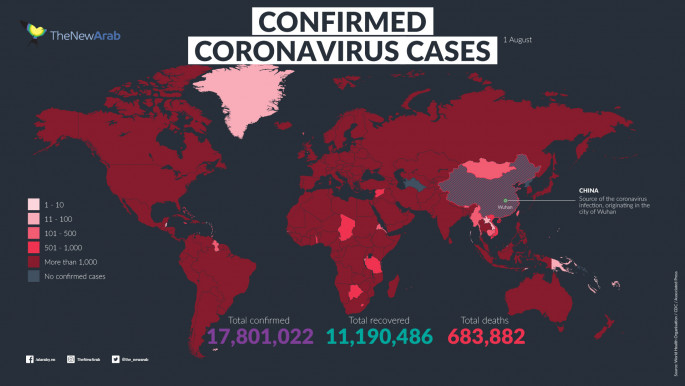Follow us on Facebook, Twitter and Instagram to stay connected
North Darfur activists record alarming rise in suspected coronavirus deaths as patients avoid hospitals
Activists in North Darfur are recording dozens of deaths from coronavirus as patients in the war-ravaged area avoid government hospitals, saying they will get no help there
3 min read
Sudan's coronavirus cases could be much higher than official figures sugges [Getty]
Doctors in Sudan's North Darfur state have recorded a spike in deaths over the past two weeks, and concerns have arisen that they might indicate a coronavirus outbreak which could be disastrous for this area of Sudan, which is still suffering from the effects of a devastating conflict.
Activists have been recording deaths among their relatives in the town of El Fasher, where some 200,000 people live, prompting worries that Covid-19 could be killing older people in their homes, the Guardian reports.
On some days, more than 60 deaths have been recorded by activists, although numbers could be much higher as most people are avoiding hospitals. There is, however, no official coronavirus death toll
The official figures say that there are only 30 cases of coronavirus in El Fasher, and UN and Afican Union peacekeeping forces say that seven of their members have caught the Covid-19 virus at their base in the city.
But Suad Musa, a local activist, told The Guardian that there had been a sharp rise in illness and deaths recently.
“They have it just one week and they just die. Sometimes just three days. It’s just a few days and they get unable to breathe and then they die.
“That’s what leads them to think it’s Covid-19 but they did not know,” she said.
Part of the problem, a UN employee told The Guardian, is that people are avoiding going to hospital because of a lack of transport facilities, and a belief that hospitals do not help.
Read more: Sudan to establish police force to protect healthcare workers as coronavirus pandemic continues
Initially, many were dismissive of the threat Covid-19 posed, and thought that the increasing deaths were due to malaria.
“People think that if somebody passed away, why should we send them to the hospital? Anyway in El Fasher we don’t do this Covid-19 test, we have to send it to Khartoum and it can take five days to return,” they said.
“That’s why there’s a gap between the government figures and what’s happening in the community.”
In Nyala, a city in Darfur 100 miles from El Fasher, a new Covid-19 testing centre has been announced, though it is not yet operational.
More than 4,000 cases of coronavirus have been reported in Sudan with 195 deaths, however those are only official statistics and it is likely the actual numbers are much higher.
Hospitals in North Darfur lack the protective equipment for healthcare workers, and are ill-equipped to deal with an outbreak, Dr Elnazeer Mohammed Thani told The Guardian.
“Most of these healthcare facilities lack basic equipment to provide even primary care,” he said.
“There is no central oxygen or even oxygen generator in the state. We depend on the supply from Khartoum, which is 1,300km from El Fasher.”

Activists have been recording deaths among their relatives in the town of El Fasher, where some 200,000 people live, prompting worries that Covid-19 could be killing older people in their homes, the Guardian reports.
On some days, more than 60 deaths have been recorded by activists, although numbers could be much higher as most people are avoiding hospitals. There is, however, no official coronavirus death toll
The official figures say that there are only 30 cases of coronavirus in El Fasher, and UN and Afican Union peacekeeping forces say that seven of their members have caught the Covid-19 virus at their base in the city.
But Suad Musa, a local activist, told The Guardian that there had been a sharp rise in illness and deaths recently.
“They have it just one week and they just die. Sometimes just three days. It’s just a few days and they get unable to breathe and then they die.
“That’s what leads them to think it’s Covid-19 but they did not know,” she said.
Part of the problem, a UN employee told The Guardian, is that people are avoiding going to hospital because of a lack of transport facilities, and a belief that hospitals do not help.
Read more: Sudan to establish police force to protect healthcare workers as coronavirus pandemic continues
Initially, many were dismissive of the threat Covid-19 posed, and thought that the increasing deaths were due to malaria.
“People think that if somebody passed away, why should we send them to the hospital? Anyway in El Fasher we don’t do this Covid-19 test, we have to send it to Khartoum and it can take five days to return,” they said.
“That’s why there’s a gap between the government figures and what’s happening in the community.”
In Nyala, a city in Darfur 100 miles from El Fasher, a new Covid-19 testing centre has been announced, though it is not yet operational.
|
More than 4,000 cases of coronavirus have been reported in Sudan with 195 deaths, however those are only official statistics and it is likely the actual numbers are much higher.
Hospitals in North Darfur lack the protective equipment for healthcare workers, and are ill-equipped to deal with an outbreak, Dr Elnazeer Mohammed Thani told The Guardian.
“Most of these healthcare facilities lack basic equipment to provide even primary care,” he said.
“There is no central oxygen or even oxygen generator in the state. We depend on the supply from Khartoum, which is 1,300km from El Fasher.”






 Follow the Middle East's top stories in English at The New Arab on Google News
Follow the Middle East's top stories in English at The New Arab on Google News

![Israeli forces ordered bombed Gaza's Jabalia, ordering residents to leave [Getty]](/sites/default/files/styles/image_330x185/public/2176418030.jpeg?h=a5f2f23a&itok=_YGZaP1z)
